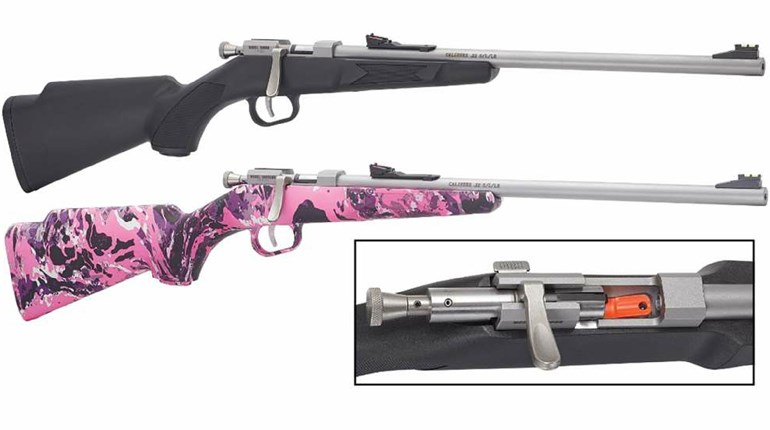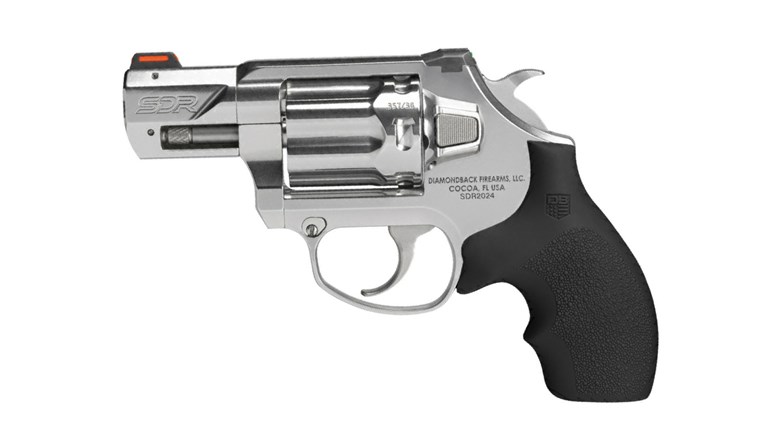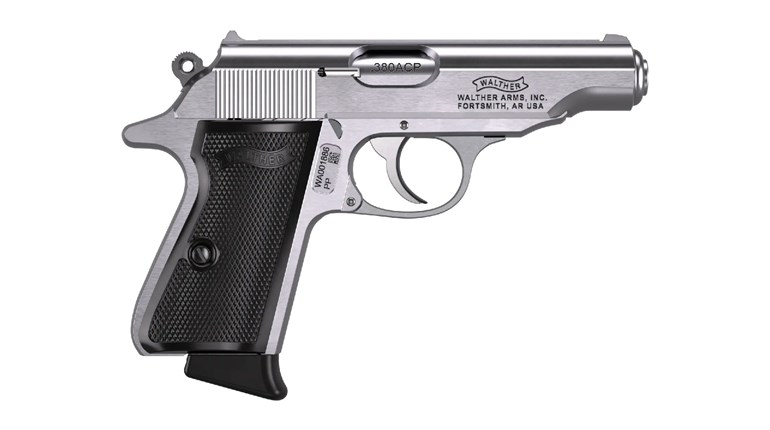
It’s easy to indulgently chuckle when handgunning conversation rolls around—so to speak—to revolvers. But if you believe revolver progress must have ended in either the 19th or 20th centuries, it’s time to reconsider.
This feature appears in the July ‘17 issue of NRA America’s 1st Freedom, one of the official journals of the National Rifle Association.
Certain types of firearms are more, well, fun to review than others. There are several reasons for such a happy circumstance. Excellence is an easy multiplier, and obvious application or interesting technology (new or old) are other examples. We would also put broad familiarity in the same class: Here, the basics require little or no exploration and explanation, and getting “off in the weeds”—usefully, we hope—is where the fun compounds.
Our latest Smith & Wesson is a case in point. As an N-frame, little in the way of description is necessary: It’s a large, heavily built, double-action revolver well suited to extensive, even punishing use. In the case of other N-frames, this was, or is, necessary to handle substantial recoil and famously powerful cartridges. In the case of the 929, the generous frame dimensions instead accommodate a seventh and eighth round of delightfully soft-shooting and inexpensive 9 mm Luger.
The Performance Center marque on our stainless 929 also says a lot about the readiness of this titanium-cylindered dreadnaught for a variety of tasks.The Performance Center marque on our stainless 929 also says a lot about the readiness of this titanium-cylindered dreadnaught for a variety of tasks. Easiest to appreciate is the excellent trigger in both single and double action. The former will appeal to shooters who like the challenge of the long shot, and will be handsomely aided by the long sight radius over a 6.5-inch barrel. We added a fiber front as our photos attest, but the razor-sharp black on black of the stock front blade and adjustable rear were a precise, flat-shooting dream when adequate light was available.
Double-action applications, however, is where the core of users will flock, or at least so we think; with moon clip loading, eight fresh cartridges can replace spent rounds with nearly semi-automatic, magazine-fed haste. This will carry a 929 shooter through the travails of many disciplines, and strikes us as especially apropos for Steel Challenge, ICORE and USPSA-style shooting. If our assurances seem sketchy, we’ll see your suspicions and raise you a “Jerry Miculek” signature on the right side of the frame. Enough said, we believe.
But if all you’re really looking for is a thoroughly up-to-date wheel gun, our range work suggests a 929 may still be a fine fit in many a shooting bag. The plainest reason relates to the seemingly outsized N-frame. We’ve already acknowledged the two additional rounds—just plain fun in the “more shooting, less reloading” sense—but the 9-ounce weight bump (over the fine seven-shot L-frame 986, for instance) makes for notably docile shooting. Even with heavier, defensive-type loads, the 929 remained uncommonly well-behaved.
Such ammunition illustrates another, and perhaps unsuspected, “plus” for the big 9 mm. Conventional revolvers have always been admired for their reliability, and as such, desirable for defensive employ. What it is not possible to easily do is store them safely, but still at the ready for an unwelcome need. Moon clip charging ends this quandary: No time-consuming “threading” of individual cartridges inviting a fumble or delay, nor unsafe loaded storage. A quick access storage solution and a moon clip put defensive wherewithal at your disposal in very few seconds.
As much as we like the Performance Center 929—and here, you should infer “a lot”—we wrap up with another facet of the moon clip business. It constitutes our biggest gripe, in fact: We discovered in a hurry that we needed a lot more of these handy little buggers, and other (happier) 929ers clearly beat us to the punch. A savior eventually appeared (see Nuts And Bolts), but don’t repeat our mistake. Plan on a small mountain of moon clips and a middling mountain of 9 mm with a 929, and you won’t be sorry.
Nuts And Bolts
We don’t often get to run a firearm that we find quite as thoroughly and immediately satisfactory as the “Jerry Miculek” Performance Center 929. Whether this reflects 165 years of Smith & Wesson expertise with the revolver or the inherent simplicity of the type is hard to say. Either way, the 929 is a sound shooting pleasure that stands up to energetic employment, but with several characteristics that take it well beyond the capacities of the average “wheel gun.”
Compensator
Compensation is no stranger to revolvers. Larry Kelly pioneered this method of reducing recoil on revolvers in the late 1960s via Mag-Na-Porting, and the 929 takes it a step further. These systems work by venting combustion gases from ports in the barrel behind the departing projectile, which in turn partially counteracts upward and/or rearward movement in recoil. In a clever solution, the 929 substitutes interchangeable muzzle caps for cuts in the barrel—one with compensation, one without.
Particularly if you reload, this offers rare versatility. There are lots of formulas that will provide exceptionally pleasant handling in a 44-ounce 9 mm handgun, but you will still trade power for a softer feel. The 929 comp changes that in quite noticeable fashion, and flat-shooting, hard-hitting formulas can cross a wide range of powders and projectile weights. Just remember: As a rule, lighter, faster bullets make more effective use of compensated configurations. Best of all, going back and forth is a few spins of an Allen key.
Moon Clips
Many revolver shooters are familiar with moon clip-configured cylinders and therefore know they’re not quite the panacea that one might expect. Mostly this has to do with variations in case dimensions that can occur in lots of brass (generally small) or between different case manufacturers (sometimes extremely large).

This was less serious with our 9 mm, but still be smart with a 929 of your own: Get clips that you know will work with the brass (for reloaders) or the brand of ammunition you plan to shoot, and don’t vary widely without small-lot testing. Smith & Wesson sends TK Custom clips that are reassuringly tight, but—you guessed it—require tools to manipulate with any real ease. TK, of course, has excellent ones.
Speed Beez sent us a bunch of theirs to try as well, and these are essentially tool-less joys with most head stamps—you’ll be able to de-moon spent cases and recharge mostly by hand. This does occasionally mean a case or round will pop out, but that’s a small price to pay for such easy use. Still, the company’s ultra-easy $9 de-mooner and clip “checker” are crazy good: Rugged, simple and speedy.
Belt Gear
The folks at Speed Beez also suggested a holster and moon clip belt rack, and we’d have to say these were the icing on our 929 cake. Secure and convenient, they’ll add comfort, at least, to any outing. If you choose to work on speed—and the 929 practically begs this—they’re completely ready for that, too.

The holster you’ll recognize as an A1F favorite of Blade-Tech origin, but it is set up to go on your belt with nary a fiddle by Speed Beez. For loaded moonies, the eight-position, magnetized belt-mount posts will seem to grab your clips too tightly, but this is illusion. They were perfect in our view—solid retention while on the move, yet allowing reloads at enviable speed in short order. True, we weren’t remotely “Jerry fast,” but who is?
Shell Shock Technologies Cases

We happened on an unexpected nugget late in our test by swapping in SST dies and running ammunition in the company’s revolutionary nickel alloy cases. Think Archimedes here: “Eureka!” Their slick surface and cool-to-the-touch-after-firing metallurgy make them a speed boon in terms of popping spent eights out. Their lighter weight compared to brass cases also moves the center of mass of cartridges forward, improving reloading practically to the point of falling into the cylinder. Like we said, “Eureka!”
Frank Winn has been studying arms and their relationship to tyranny, meaningful liberty and personal security all his adult life. He has been a firearms safety/shooting instructor for more than 20 years, and earned state, regional and national titles in several competitive disciplines.

































